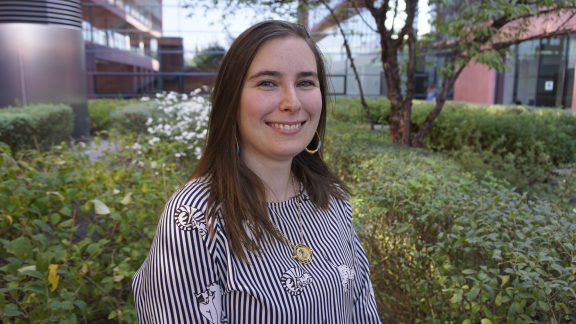Alicia Lardennois Understanding how cells communicate to coordinate their movements
Alicia Lardennois, post-doctoral fellow, Institute for Cell Biology and Neuroscience - Department of Developmental Biology of Vertebrates, Goethe University, Frankfurt-am-Main, Germany
- 2020 • Bettencourt Prize for Young Researchers

The 2020 Bettencourt Prize for Young Researchers was awarded to Alicia Lardennois, a post-doctoral fellow in developmental biology, for her research on cell communication and migration.
Coordinating cell movements: a communication story?
During embryonic development, cells change position, singly or in groups, to form tissues and organs. When cells migrate in groups, it is called collective migrations. These mobile cell groups can have different sizes and shapes within the embryo. Alicia Lardennois wants to understand the mechanisms that allow cells to coordinate their movements within the same group.During her post-doctoral project at Goethe University, Dr. Lardennois worked at the interface between biology and physics. She studies the lateral line of the zebrafish. The lateral line is a sensory organ specific to aquatic vertebrates and similar to our inner ear. It gives the fish a keen perception of vibrations and water pressure, allowing it to adjust its direction and speed. It is formed by the collective migration of about 100 cells that move from the head to the tail of the embryo in about 24 hours. Zebrafish embryos are transparent, so the cells can be observed at very high resolution in the living embryo. Dr. Lardennois will use this model to understand how cells use chemical or mechanical signals to communicate to coordinate their movements. Her work will lead to a better understanding of how a migrating cell group functions. The findings will also have significance in oncology, to better understand how cancer cells invade other places through metastasis.
Alicia Lardennois in a few words
Alicia Lardennois specializes in developmental biology.
Her doctoral research in the developmental biology laboratory at the Paris-Seine Biology Institute focused on characterizing the mechanical forces at work in embryonic elongation. In her research model C. elegans, a small, transparent, one-millimeter-long worm, the elongation occurs without division but by varying the shape of the epidermal cells through muscle activity. She discovered a new cellular network of proteins that gradually reshape the cell through muscle contractions.
Her post-doctoral fellowship gives her the opportunity to deepen her research on the ability of proteins to send mechanical signals to neighboring cells in order to coordinate cell movements. By combining genetics, cell biology and advanced imaging, she tries to understand how these mechanisms are organized in time and space.
Bettencourt Prize for Young Researchers
Created in 1990, the Bettencourt Prize for Young Researchers is one of the first initiatives of the Fondation Bettencourt Schueller. Until 2021, this prize was awarded each year to 14 young doctors of science or doctors of medicine, to enable them to carry out their post-doctoral stay in the best foreign laboratories. 349 young researchers were distinguished. The prize endowment was €25,000.
All the award-winners